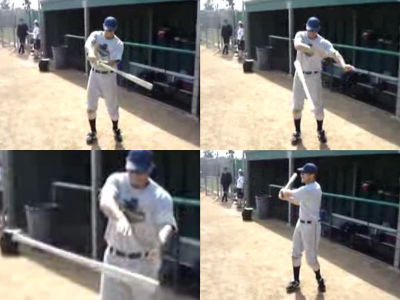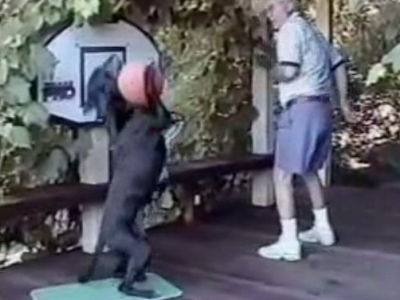Google develops AI table tennis robot that can play at human level, but there are challenges in playing against advanced players

Google's AI research division, Google DeepMind, has developed a table tennis robot that can play at 'amateur human level.'
[2408.03906] Achieving Human Level Competitive Robot Table Tennis
https://arxiv.org/abs/2408.03906
Meet our AI-powered robot that's ready to play table tennis.
— Google DeepMind (@GoogleDeepMind) August 8, 2024
It's the first agent to achieve amateur human level performance in this sport. Here's how it works. ???? pic.twitter.com/AxwbRQwYiB
Google DeepMind develops a 'solidly amateur' table tennis robot | TechCrunch
https://techcrunch.com/2024/08/08/google-deepmind-develops-a-solidly-amateur-table-tennis-robot/
According to Google DeepMind, a table tennis robot must be able to perform not only low-level skills such as hitting the ball back at an opponent, but also high-level skills such as devising a strategy to achieve a goal and executing a long-term plan to win. Therefore, it has been developed as a benchmark in robotics since the 1980s.
Robotic table tennis has served as a benchmark for this type of research since the 1980s.
— Google DeepMind (@GoogleDeepMind) August 8, 2024
The robot has to be good at low level skills, such as returning the ball, as well as high level skills, like strategizing and long-term planning to achieve a goal. pic.twitter.com/IX7VuDyC4J
Google DeepMind collected information about the ball's position, speed and spin, teaching the robot various skills such as forehand topspin, backhand targeting and serve return.
To train the robot, we gathered a dataset of initial table tennis ball states - which included information about position, speed, and spin.
— Google DeepMind (@GoogleDeepMind) August 8, 2024
The system practiced using this library and learned different skills, like forehand topspin, backhand targeting, and returning serves. pic.twitter.com/zqGg1Fxf7F
During training, the table tennis robot will first train in a simulation and then be deployed in the real world to compete against humans, collecting performance data and providing feedback to refine its skills.
Our robot first trains in a simulated environment, which can model the physics of table tennis matches accurately.
— Google DeepMind (@GoogleDeepMind) August 8, 2024
Once deployed to the real world, it collects data on its performance against humans to refine its skills back in simulation - creating a continuous feedback loop. pic.twitter.com/Yyz4KA09yp
The ping-pong robot developed by Google DeepMind is designed to adapt to different opponents by analyzing their behavior and playing style, such as which side of the table they tend to hit the ball to. 'This allows the robot to try out different skills and test their success rate, adjusting its strategy during the match,' Google DeepMind said.
We also designed the system to adapt to various opponents by tracking their behaviors and playing style - such as which side of the table they tend to return the ball to.
— Google DeepMind (@GoogleDeepMind) August 8, 2024
This allows it to try different skills, monitor its success rate and adjust its strategy on the fly. pic.twitter.com/8TExTdKZ0v
In this test, the table tennis robot played a total of 29 matches.
It went up against 29 unseen human opponents across 4️⃣ different skill levels during our research - from beginner to advanced.
— Google DeepMind (@GoogleDeepMind) August 8, 2024
Overall, the robot scored in the middle of participants, implying that the system can operate like an intermediate amateur. pic.twitter.com/k4ngwznowG
According to Google DeepMind, the table tennis robot achieved a 100% winning rate against beginners, but only won 55% of matches against intermediate players. It was unable to win a single match against an advanced player, and ultimately only won 45% of the 29 matches. The research team said, 'There are physical and technical limitations, such as reaction speed, camera sensing ability, spin processing, and racket rubber, which make it difficult to accurately model in simulations.'
Was it able to beat an advanced player? ????
— Google DeepMind (@GoogleDeepMind) August 8, 2024
In short, no. There are physical as well as skill limitations, including: reaction speed, camera sensing capabilities, spin handling and the paddle rubber, which is hard to accurately model in simulation. pic.twitter.com/oBLXiep1cu
Still, Google DeepMind said, 'Our table tennis robot is the first robotic agent that can play a sport with humans at a human level, and represents a milestone in robotic learning and control. However, this is only a small step toward the long-standing goal of robotics to achieve human-level performance in real-world skills, and much work remains to be done to successfully collaborate with humans in the real world.'
◆ Forum is currently open
A forum related to this article has been set up on the official GIGAZINE Discord server . Anyone can post freely, so please feel free to comment! If you do not have a Discord account, please refer to the account creation procedure explanation article to create an account!
• Discord | 'What kind of sports robot would you like to see?' | GIGAZINE
https://discord.com/channels/1037961069903216680/1271407544287498282
Related Posts:







